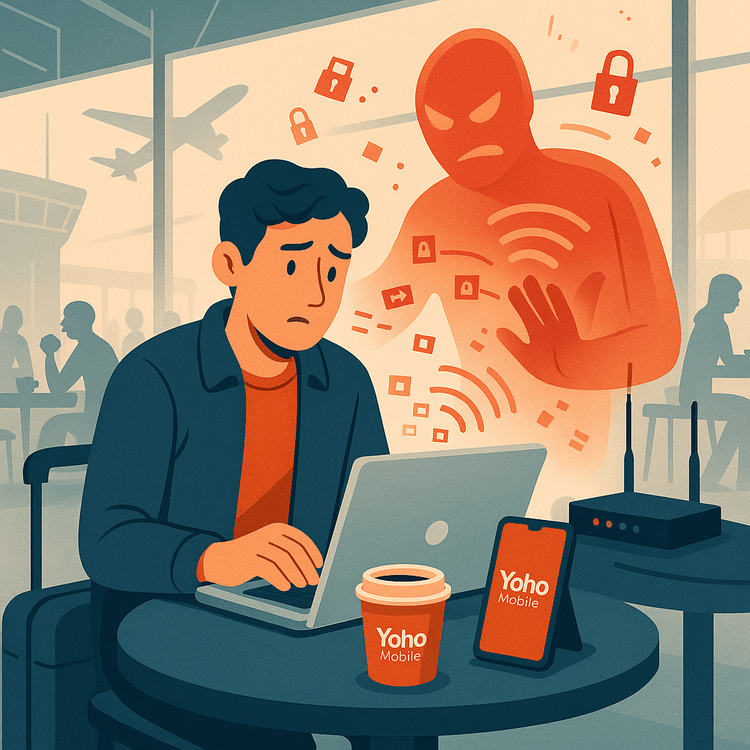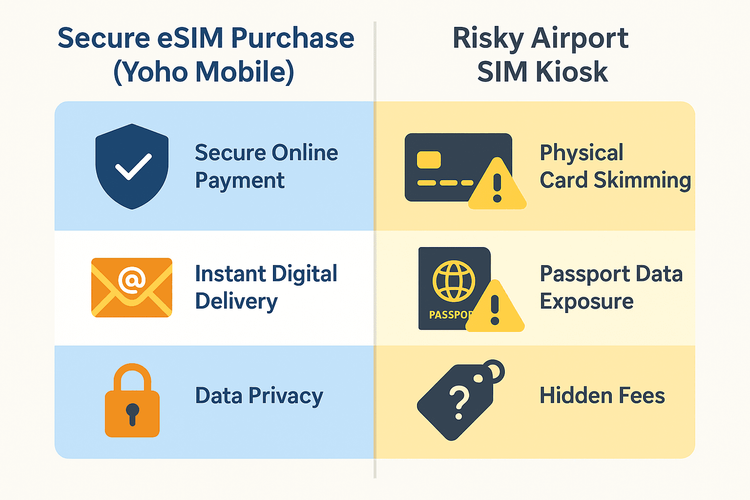Safe Online Credit Card Use While Traveling | 2025 Security Guide
Luis Rafael•Aug 28, 2025
Traveling in 2025 is a digital-first experience. From booking last-minute train tickets in Japan to ordering a ride-share in New York, your credit card is your key to a seamless journey. But as you connect to cafe Wi-Fi and browse foreign websites, a nagging question often arises: is it really safe to use your credit card online while traveling? The answer is yes, but only if you take the right precautions.
Online convenience shouldn’t come at the cost of your financial security. The digital landscape for travelers is filled with opportunities, but also potential pitfalls like data theft and travel scams. This guide will walk you through the essential international travel security practices to protect your credit card abroad, ensuring your focus remains on the adventure, not on anxiety. The first step to peace of mind? Ensuring your tools, like your internet connection, are secure from the start. You can even test the waters with a free eSIM trial from Yoho Mobile to see how easy secure connectivity can be.
The Digital Minefield: Common Online Security Risks for Travelers
When you’re away from your trusted home network, you become a more attractive target for cybercriminals. Understanding the threats is the first step in building a strong defense. Here are some of the most common risks you’ll face when making online payments abroad.
- Unsecured Public Wi-Fi: That free Wi-Fi at the airport, hotel, or coffee shop is a major risk. Hackers can set up fake networks or use sophisticated tools on legitimate ones to perform “Man-in-the-Middle” attacks, intercepting every piece of data you send—including credit card details and passwords.
- Phishing and Smishing Scams: Travelers are often targets for urgent-sounding emails (phishing) or text messages (smishing) disguised as flight confirmations, hotel booking issues, or customs fee alerts. These messages contain malicious links designed to steal your information on fake login or payment pages.
- Insecure Websites & Skimmers: Not all international websites adhere to the highest security standards like PCI DSS. You might encounter e-commerce sites with outdated security, making your payment details vulnerable. Digital “skimmers” can also be hidden in the checkout pages of compromised websites, silently copying your card information.

Your Digital Shield: How to Protect Your Credit Card and Data Abroad
Staying secure doesn’t require being a cybersecurity expert. A few proactive steps and mindful habits can dramatically reduce your risk. Here’s how to create a digital shield for your finances.
Before You Go: Pre-Trip Security Checklist
A solid defense starts before you even pack your bags. Prepare your finances for international travel with this checklist:
- Inform Your Bank: Let your bank and credit card companies know your travel dates and destinations. This prevents them from flagging legitimate international transactions as fraud and blocking your card when you need it most.
- Set Up Transaction Alerts: Enable real-time SMS or email alerts for all credit card transactions. This allows you to spot any unauthorized activity instantly.
- Consider a Dedicated Travel Card: Use a credit card with low-to-no foreign transaction fees specifically for your trip. This limits your exposure if the card is compromised. For even greater security, look into virtual credit card numbers offered by some banks, which create a temporary card number for a single transaction.
- Enable Two-Factor Authentication (2FA): As recommended by security experts at institutions like CISA and the NSA, 2FA is one of the most effective ways to secure your accounts. Enable it on all your banking and important online accounts.
On the Road: Safe Online Practices
Once you’re traveling, stay vigilant with these habits:
- Always Use a VPN: A Virtual Private Network (VPN) is your best defense on public Wi-Fi. It encrypts your internet connection, making it unreadable to anyone trying to snoop. Think of it as a secure, private tunnel for your data. Reputable tech publications like PCMag have extensive guides on choosing the right one.
- Look for ‘HTTPS’: Before entering payment information on any site, check that the URL starts with https:// and has a padlock icon in the address bar. This indicates the connection to the site is encrypted.
- Choose Secure Vendors: When buying travel essentials like mobile data, stick to trusted, reputable platforms. Purchasing an eSIM online is far more secure than using unknown vendors. For instance, Yoho Mobile offers a secure, encrypted payment process, ensuring your financial data is protected. When you’re ready to top up, you can confidently purchase a flexible data plan for your trip.
Why a Secure eSIM Provider Matters for Your Digital Safety
Your internet connection is your gateway to the digital world while traveling, and how you acquire it matters. While convenient, buying a physical SIM card from a random airport kiosk can introduce security risks. It often requires handing over your physical passport and credit card, creating opportunities for data skimming or improper storage of your personal information.
This is where a trusted digital provider like Yoho Mobile enhances your international travel security. Here’s why:
- End-to-End Encryption: The entire purchase process on the Yoho Mobile platform is secured with industry-standard encryption. Your payment details are transmitted safely, directly to the payment processor, without being stored on vulnerable servers.
- No Physical Exposure: You buy and install your eSIM digitally. Your credit card never leaves your hand, and your passport stays in your bag. This completely eliminates the risk of physical skimming at a kiosk.
- Peace of Mind with Yoho Care: What happens if your data runs out unexpectedly and you’re tempted to connect to a sketchy, free Wi-Fi network? With Yoho Care, you’re never truly disconnected. Even if your plan is depleted, we provide a backup connection for essential services, so you can securely top up your data without resorting to unsafe networks.
Before traveling, always ensure your device is compatible by checking our eSIM compatible devices list.

Frequently Asked Questions (FAQ)
Q1: What is the safest way to pay for things online abroad?
The safest method is using a credit card (which offers better fraud protection than a debit card) through a secure, encrypted connection like a VPN, especially on public Wi-Fi. Using virtual credit card numbers or digital wallets like Apple Pay or Google Pay, which tokenize your card details, adds another strong layer of security.
Q2: Should I use a VPN every time I use public Wi-Fi while traveling?
Absolutely. A VPN is a non-negotiable tool for digital safety for travelers. It encrypts your data, protecting you from hackers and eavesdroppers on any public network, whether you’re making a payment, checking emails, or simply browsing.
Q3: Is buying an eSIM online safe for international travel?
Yes, it is extremely safe, provided you buy from a reputable and established provider like Yoho Mobile. A secure provider will have an encrypted website (HTTPS), a clear privacy policy, and a professional payment process. This is often much safer than buying physical SIMs from unregulated street vendors or kiosks.
Q4: How can I tell if an online shopping site is a scam?
Look for red flags like a missing HTTPS certificate, poor grammar and website design, unbelievably low prices, and a lack of contact information or physical address. If a deal seems too good to be true, it probably is. Check for reviews on external sites before making a purchase. The U.S. Federal Trade Commission offers great resources on this.
Q5: How can I protect my credit card information when traveling in Europe?
All the tips in this guide apply, but for Europe, also be aware of contactless payment limits. Use tap-to-pay for small purchases to avoid inserting your card. When booking train tickets or tours online, use well-known, official vendor websites and always connect via a VPN if you’re not on a trusted network. Planning a trip? Stay connected securely with our Europe eSIM plans.
Conclusion: Travel with Confidence
Using your credit card online while traveling doesn’t have to be a source of stress. By being proactive with your security measures before you leave and staying mindful of your digital habits on the road, you can confidently navigate the digital world.
Remember the golden rules: always use a VPN on public networks, verify website security before entering payment details, and choose trusted digital providers for your travel needs. Services like Yoho Mobile are designed not just for convenience and affordability, but also with your digital safety as a top priority.
Now you’re equipped with the knowledge to protect yourself. Go explore the world, stay connected, and make your purchases with peace of mind. Explore Yoho Mobile’s flexible and secure eSIM plans for your next adventure.
